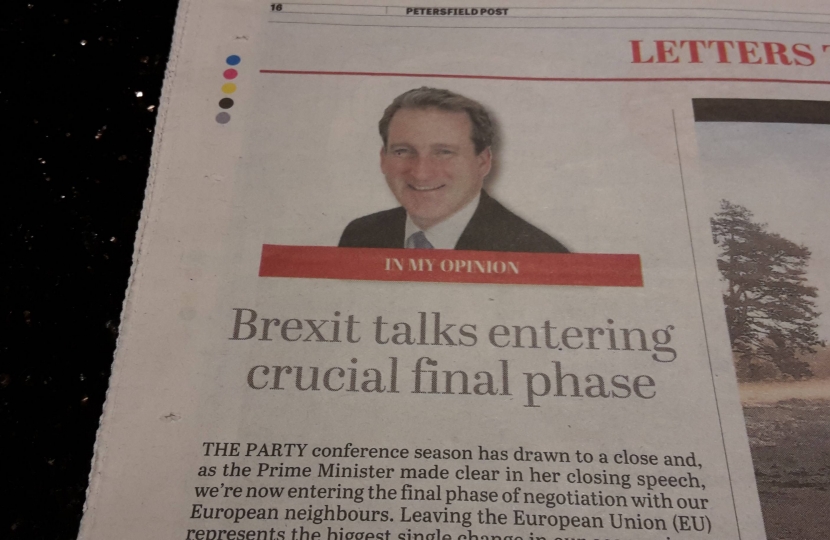
Damian writes a regular column in the Petersfield Post, and he talks about the final phase of Brexit negotiations in the latest one published today:
"The party conference season has drawn to a close and as the Prime Minister made clear in her closing speech, we’re now entering the final phase of negotiation with our European neighbours.
Leaving the EU represents the biggest single change in our economic relationships during my lifetime. No one should doubt the complexity; the myriad of regulations, protocols, legal frameworks and financial considerations that underpin the thousands of touch-points of trade and cooperation between the UK and the remaining 27 members of the European Union.
But what is not in doubt is the need for us to deliver on the referendum result. From the moment we had the result, it has been incumbent on everyone in public life and involved in public policy to seek to secure the best Brexit deal possible for our country.
But that does not mean we have to accept a poor deal. The agreement of the Cabinet at Chequers was an important step in our country putting forward the best proposals to the European Union for how we want our future relationship to work.
It is important to acknowledge that we have multiple objectives and there is tension between some of those objectives. In short, there is no available option for our future relationship with the EU which does, or could ever, perfectly satisfy all of those different criteria. So, in critiquing any particular option, it does not work to critique it relative to some theoretical optimal solution; it only works to compare it to another available option and to establish if it is better than that or not.
The need to safeguard the status of Northern Ireland is a key imperative in what we must secure. This means not instituting a hard border between the North and the Republic, and ensuring Northern Ireland remains an integral part of the UK, without major new differentiation in constitutional status between Great Britain and Northern Ireland.
Another absolutely critical consideration is trade, and no less so for businesses right across Hampshire, from the container port in Southampton to East Hampshire’s farmers and our high-end engineering specialists. Trade, directly or indirectly, drives economic growth, creates jobs and, along with productivity improvement and innovation, enables us to increase the payments that we make over time for the essential public services upon which we all depend so much.
It has been suggested that we could adopt a model based on the Canadian relationship with the EU, the so-called CETA Plus, but a fundamental issue here is what happens with the status of Northern Ireland, as well as the potential frictions in trade.
And models proposed along the lines of the EEA would run into the “indivisibility of the four freedoms” and our need to manage the number of people moving to the UK.
There are also many different types of no-deal, ranging from absolutely no deal at all, to having a managed migration to WTO rules. The volume of trade with our near neighbours, as well as some other considerations, makes this an uncomfortable option. Put simply, a drive to move beyond WTO rules is generally at the heart of advanced economies’ trade policies.
Nevertheless, it is essential in any negotiation that it is possible to walk away. Only then can you secure the best possible deal. For that reason, it is vital that our preparations for the no-deal scenario also continue."
Written by Damian Hinds and published in the Petersfield Post on Wednesday 10th October 2018

